- Home
- Rose Tremain
The Garden of the Villa Mollini Page 10
The Garden of the Villa Mollini Read online
Page 10
Micky stands for a while where the gate used to be. On my mark, he thinks. Yet the altered landscape behind him robs it of familiarity. It’s as if, in removing the house, someone has removed his younger self from the place where he used to stand.
No point in staying, he decides, so he walks slowly back past the holly tree to his car. He gets in, releases the handbrake and lets it slip gently backwards down its own tracks. At the bottom of the lane, he starts the engine, reverses out into the road and drives away.
In the afternoon, he goes down to the shingly beach. The sun’s low and the wind coming off the sea strong enough to make the sleeves of his anorak flap. He crouches near a breakwater. He sets up his machine, tests for sound levels, then holds the microphone at the ocean. He remembers his instructions: ‘With the sea recording, Micky, try to get gulls and any other seabirds. And do plenty of selection, strong breakers close up, smaller splashing waves without much wind, and so on. Use your judgment.’
The scene his microphone is gathering is very beautiful. He wishes, for once, that he was gathering pictures as well as sound. The snow still lying high up on the beach and along the sea wall is almost violet-coloured in the descending afternoon. A film maker might wait months to capture this extraordinary light. Micky closes his eyes, forcing himself to concentrate on the sound only. When he opens them again, he sees a man standing still about thirty yards from him and staring at him.
Micky stays motionless, closes his eyes again, hears to his satisfaction gulls calling far off. When he opens his eyes once more, he sees that the man has come nearer, but is standing in the same attitude, intently watching Micky.
So Micky’s thoughts return to the morning, to his discovery that someone had been peering into his car, then to his visit to the house which had gone, and he feels, not fear exactly, nor even suspicion, but a kind of troubled excitement and all the questions his mind has been asking for years about this place and the person he loved in it suddenly clamour in him for answers. He looks up at the stranger. He’s a tall, straight-standing person. His hands are in the pockets of a long coat. In his stern look and in his straightness, he reminds Micky of Harriet Cavanagh’s father, in the presence of whom Micky Stone felt acutely his own lack of height and the rounded disposition of his shoulders. But he tells himself that the fierce Major Cavanagh must now be an old man and this stranger is no more than forty-five, about the age Harriet herself would be.
Micky looks at his watch. He decides he will record three more minutes of sea and that then he will go over to the man and say what he now believes he’s come here to do: ‘I’m looking for Harriet Cavanagh. This may sound stupid. Are you in a position to help me?’
Then Micky turns away and tries to concentrate on the waves and the birds. He dreads speaking to the man because he was never any good at expressing himself. When Harriet Cavanagh said of the shiny white morning, ‘Gosh, it’s beautiful!’ Micky was struck by her phrase like a whip and was speechless. Harriet had chosen a language that suited her: it was straight and direct and loud. Micky, huddled by his gate, knew that the dumbness of his first ten years had somehow lingered in his brain.
The three minutes seem long. The gulls circle and fight. Micky forces himself not to move a muscle. The sea breaks and is pulled back, rattling the shingle like coins, and breaks again. When Micky at last turns round, the man has gone.
On the edge of sleep, Micky hears the wind get up. Tomorrow, he will go to the windmill. He thinks, tonight I can hear my own loneliness like something inside me, turning.
Micky climbs up a broad ladder into the lower section of the mill. Its owner is a narrow-shouldered, rather frail seeming man who seems excited and pleased to show Micky round.
‘It’s funny,’ says the skinny man as he opens the trap door to the big working chamber, ‘my Dad once thought of buying a windmill, but he wanted to chuck out all the machinery and turn the thing into a house. But I’d never do that. I think far too many of the old, useful things have vanished.’
Micky nods and they mount a shorter ladder and scramble through the trap into the ancient body of the mill. Light comes from a window below the ratchet wheel and from the pulley hatch, where the sacks of corn are wound up and the bags of milled flour lowered.
‘We’re only in use for part of the year,’ says the owner, ‘but we can lower the grinding wheel so that you can get the sound of it.’
Micky nods and walks to the window and looks down. Every few moments his view of the icy fields is slashed by the passing of one of the sails, but he likes the feeling of being high up for once, not crouching or hiding. And as he stares and the arms of the windmill pass and re-pass, he thinks, I must stand up tall now for what I want and what I have always wanted and still do not possess: the sound of Harriet Cavanagh’s voice.
‘All right, then?’ asks the mill owner, disappointed by Micky’s silence. ‘I’ll set the wheel, shall I?’
Micky turns, startled. ‘Thank you,’ he says. ‘I’ll set up in here. Then I’ll do a few minutes outside.’
‘Good,’ says the mill owner, then adds, ‘I like the radio plays. “The Theatre of the Mind” someone said it was called and I think that’s a good description because the mind only needs sound to imagine entire places, entire situations. Isn’t that right?’
‘Well,’ says Micky, ‘yes, I think it is.’
It’s dark by the time Micky gets back to his lodgings. As he goes in, he can smell the meal his landlady is preparing, but he doesn’t feel hungry, he’s too anxious about what he’s going to do. He’s going to telephone the big house where Harriet lived until she married and went to live in the West Country. Though Major Cavanagh and his wife will be old, Micky senses that people who live comfortably live long and he feels certain that when the receiver is picked up it will be one of them who answers. And he knows exactly what he will say, he’s prepared it. ‘You won’t remember me, Major, but I’m an old friend of Harriet’s and would very much like to get in touch . . .’
There’s a payphone near the draughty front door of the guest house. Micky arranges 10p coins in a pile on top of it and searches in the local directory for the number. It’s there as he expected. Cavanagh, Major C.N.H., High House, Matchford.
He takes a deep breath. His landlady has a television in her kitchen and music and laughter from a comedy show are blaring out. Micky presses the receiver tight to his ear and tries to shut out the noise. He dials the number. He hears it ring six times before it’s picked up and a voice he remembers as Mrs Cavanagh’s says graciously, ‘Matchford two one five.’
‘Mrs Cavanagh,’ Micky begins, after pressing in the first of the coins, ‘you won’t remember me, but –’
‘This isn’t Mrs Cavanagh.’ says the voice, ‘Will you hold on and I’ll get her.’
‘Harriet?’ says Micky.
There’s a pause. Micky reaches out and holds on tightly to the top of the payphone box.
‘Yes. Who is this?’
‘Micky Stone.’
Another pause. The laughter from the landlady’s TV is raucous.
‘Sorry. Who?’
‘Micky Stone. You probably won’t remember me. I used to live with my mother in Slate Cottage.’
‘Oh yes. I remember you. Micky Stone. Gosh.’
‘I didn’t think you’d be here, Harriet. I was going to ask where you were so that I could ring you up and talk to you.’
‘Were you? Heavens. What about?’
Another burst of laughter comes out of the kitchen. Micky covers his left ear with his hand. ‘I hadn’t planned what about. About the old days, or something. About your pony.’
‘Golly yes. I remember. You used to stand at the gate . . .’
‘Wait!’ says Micky. ‘Can you wait a moment? Can you hang on?’
‘Yes. All right. Why?’
‘Hang on, please, Harriet. I’ll only be a minute.’
Micky feeds another lop coin into the pay slot, then runs as fast as he can up the stairs to
his room. He grabs the tape machine and the microphone and hurtles down again. His landlady opens her kitchen door and stares as he rushes past. He picks up the telephone. The recorder is on and turning, the little mike held against Micky’s head.
‘Harriet? Are you still there?’
A pause. Micky hears the door of the kitchen close.
‘Yes.’
‘So you remember me at the gate?’
‘Yes . . .’
‘I once helped whitewash your stables and the dairy . . .’
‘Yes. Lucky.’
‘What?’
‘Lucky. My little horse. He was called Lucky. My children have got ponies now, but they don’t awfully care about them. Not like I cared about Lucky.’
‘You rode so well.’
‘Did I? Yes. I loved that, the early morning rides. Getting up in the dark. It was quite a long way to your lane. I think it’d usually be light, wouldn’t it, by the time I came up there? And I’d be boiling by that time, even in snowy weather. Terribly hot, but awfully happy. And I remember, if you weren’t there sometimes, if you were working or having breakfast or something, I used to think it was rather a bad omen. I was so superstitious, I used to think the day would go badly or Lucky would throw me, or Mummy would be cross or something, and quite often it went like that – things did go wrong if I hadn’t seen you. Isn’t that stupid? I’d forgotten all that till I spoke to you, but that’s exactly how it was. I suppose you could say you were my good luck charm. And actually, I’ve often thought about you and wondered how you’d got on. I was rather sad when they demolished Slate Cottage. Did you know they had? I remember thinking every bit of one’s life has kind of landmarks and Slate Cottage was definitely a landmark for me and I don’t like it that it’s not there any more. But you knew it had gone, did you?’
‘Not till today . . .’
‘Oh, it went years ago. Like lots of things. Like Lucky and the morning rides. Horrid, I think. I hate it when things are over. My marriage is over. That’s why I’m staying here. So sad and horrid it’s all been. It just makes me think – jolly stupidly, because I know one can never bring time back – but it does make me see that those days when I was growing up and you were my lucky charm were important. What I mean is, they were good.’
Lying in bed, Micky waits till the house is quiet. Outside his window, the snow is falling again. When he switches on the recorder and listens to Harriet’s voice, he realises for the first time that he forgot to put in a new tape and that most of his work at the windmill is now obliterated. About a minute of it remains, however. As Harriet Cavanagh fades to silence, her words are replaced by the sound of the big sails going round and round.
The Kite Flyer
In my captors’ glossless eyes do I see an enviousness of the lustre in mine own.
– from the Prison Treatise of Anna of Didsmill 1643
VERY OFTEN, WHEN Olivia Kingswell spoke encouragingly or chidingly to herself, she addressed herself as ‘my dear’. ‘Pick up the pieces, my dear.’ ‘Don’t make a spectacle of yourself, my dear.’
Then, on a certain day, a Sunday in early summer, she decided to break this habit. ‘You are Olivia,’ she told her bulgy blue eyes in the hall mirror, ‘it’s as simple as that.’ And she felt amazed, as she went to the kitchen to baste the Sunday joint, that she’d been so polite, so over-polite to herself for so long. ‘It’s ridiculous!’ she sniffed.
On the same Sunday, her husband, Anthony Kingswell, as he sat and waited for his beef and potatoes, felt cold. The coal scuttle in the sitting room was empty. He took it out to the coal bunker and filled it up, fetched dry kindling from the woodshed and made a fire. It was May. The light coming in to the Kingswells’ sitting room was so glaring that the colours of Anthony’s fire looked feeble. He knelt over it, holding out his hands.
Olivia, her apron on, her nose pink from the hot kitchen, came in. She had the carriage of a Great Dane, Anthony thought, stately but bounding. Today, on his knees, he felt small beside his wife.
‘Darling,’ she said, ‘what are you doing?’
‘Trying to warm up,’ he said.
‘It’s May,’ said Olivia.
‘I know it’s May,’ said Anthony.
Sunday was usually the day when Anthony Kingswell felt warmest, happiest and most close to God.
For nine years, as Vicar of the Church of St Barnabas, Didsmill, he had thought of Sunday as ‘belonging’ to him. This wasn’t arrogance, it was simply a reaffirmation, as the Church years succeeded one another, that he had chosen the right profession. Walking, in early light, from the vicarage gate to the vestry door, smelling damp yew, touching the iron cold of the latch, he would feel God slumbering in his blood. Then, robing for Communion, as old Tom Willis tugged out with leathery hands a funereal clang from the bell, his cheeks would start to become rosy with Jesus, his fingernails pink and shiny with Jesus, and at his throat would wait the syllables of praise and thanksgiving for the knowledge that God was now wide awake in his body. Even in the depths of winter, Anthony was warm on Sundays. He could have given January sermons in his underwear. He’d look out at his meagre congregation, hunched up in overcoats and scarves and woolly hats and think, Poor things, I hold up the chalice to their lips and they sip, and yet they’re chilly. What a sad coldness this must be.
Now, on this Sunday in May, the second Sunday before Whitsun, here was Anthony lighting a fire and kneeling in front of it and shivering. He knew it had been growing in him for some weeks, this awful feeling of being cold. In the same way, Olivia’s awareness that she had been too polite, too evasive a person had been growing in her for about the same number of weeks, though neither Olivia nor Anthony could have said for precisely how long. However, these things were happening: God was slipping out of Anthony’s veins, Olivia had learned the rightness, the sternness and the beauty, even, of her Christian name.
Though she was a conscientious vicar’s wife – efficient at fund-raising, gentle-voiced, an enthusiastic maker of bramble jelly – Olivia had never been very curious about faith. She saw it as something Anthony possessed and always would, and which she didn’t and never would, like a penis. It neither worried her, nor made her envious. What she had acknowledged – until recently, until she made one of the great discoveries of her life – was that her life lacked purpose. She would sit at Matins and watch her husband mount his pulpit, and know that Anthony and the Church of England were like the desert traveller and his camel, self-sufficient in the midst of emptiness, going patiently on from one small oasis to another. Olivia never yearned for her own camel. She got on with the years. One of the things she loved most about life was discovering the past. She often felt that without her local library she would have been a rather morose woman, but history made her excitable. And then, quite by chance, among the red and green and brown spines of the seventeenth century, she discovered Anna of Didsmill Wold.
One of the questions never asked by those later involved in the ‘case’ of Anthony and Olivia Kingswell was ‘Why did Anna of Didsmill inspire Olivia in the way she did?’ The answer (or at least part of the answer) lay in the fact that Anna was not only a martyr to her cause and a woman of action, she was also the eldest daughter of a country schoolmaster (as was Olivia), she was born on July 16th, 1620 (exactly three hundred and fourteen years to the day before Olivia), and is known, in prison, to have asked her captors for a dish of greengages, Olivia’s favourite fruit. Thus, it was immediately clear to Olivia that she shared much ‘common ground’ with Anna. Part of this ‘common ground’ was the actual earth on which they both walked – the lanes, the fields and the wold of Didsmill. As Olivia’s hands turned the pages of Anna’s history, they trembled.
To summarise for those who do not know of her, Anna of Didsmill was born into a moderately poor Puritan family five years before the accession of Charles I. At the age of twenty-two, shepherding her father’s flock of pupils into the school yard one August morning in 1642, Anna heard the voice of her stern
God coming out of the school-house weathercock. The voice told her to emulate the Maid of Orleans, to don a soldier’s uniform and help bring victory to the Protestant cause against the King.
That same night, wearing her brother’s clothes, she rode secretly to Fenny Stratford, where Cromwell was camped, and two months later she was fighting with his army at Edge Hill. During the battle, she fell from her horse and was captured by the Royalists. In prison, her identity as a woman was quickly revealed. She was abused by her guards, raped and tortured. She was tried for treason, found guilty and hung at Didsmill gibbet. While in prison, she wrote (and smuggled out) a treatise on the wrongs she had suffered at the hands of men, exemplifying all the evils and degradations society metes out to women. Thus, she was both a woman of action and a reformer. Yet historians had neglected her. She languished in Olivia’s library in one small book. Olivia rescued her. She gave a talk to the Didsmill and Didsborn W.I. about her. She discovered the cottage where she’d lived and the site of the old school-house (burned down in 1805) where she heard God’s voice. Slowly, yet persuasively, Anna was entering Olivia’s mind. And one day, Olivia walked on the downland where the gibbet had once stood. She knew there would be no trace of it. On the exact spot where Anna of Didsmill had died, there was an aircraft hanger and the land for six miles around it was a criss-cross of runways and concrete barracks. It was an American airbase. It was rumoured that missile silos were going to be built here.
Olivia put her hands up to the perimeter fence and imagined that this woman of long ago spoke to her in the sighing of the wire: ‘Do what you can,’ the voice said kindly.
If it was quite easy, then, to understand why Olivia Kingswell found a new direction of her life through her discovery of Anna of Didsmill Wold, it was much more difficult to determine (and remember, these two events went on simultaneously) why Anthony Kingswell began to lose his faith.

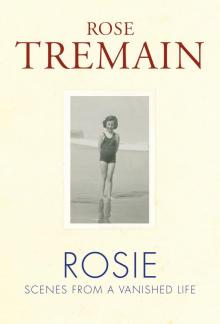 Rosie
Rosie The Garden of the Villa Mollini
The Garden of the Villa Mollini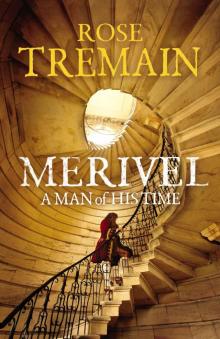 Merivel: A Man of His Time
Merivel: A Man of His Time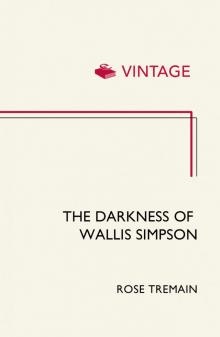 The Darkness of Wallis Simpson
The Darkness of Wallis Simpson Earth
Earth Sacred Country
Sacred Country The Swimming Pool Season
The Swimming Pool Season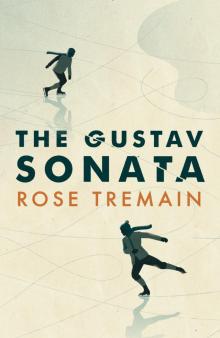 The Gustav Sonata
The Gustav Sonata Sadler's Birthday
Sadler's Birthday The Cupboard
The Cupboard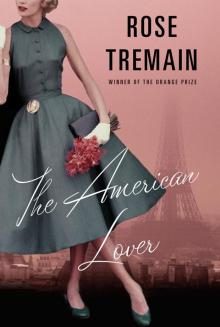 The American Lover
The American Lover Letter to Sister Benedicta
Letter to Sister Benedicta Evangelista's Fan
Evangelista's Fan Restoration
Restoration The Road Home
The Road Home The Colonel's Daughter
The Colonel's Daughter The Way I Found Her
The Way I Found Her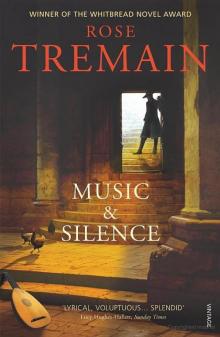 Music & Silence
Music & Silence